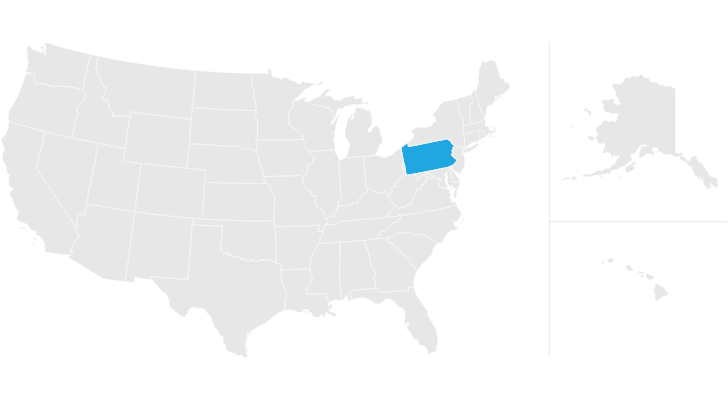

Pennsylvania does not have an estate tax. No matter the size of the estate, it will owe nothing to the state of Pennsylvania before the money is dispersed to heirs. There is a federal estate tax that may apply, and Pennsylvania does have an inheritance tax. If you think you might need help with estate planning or financial planning more generally, SmartAsset’s free financial advisor matching tool can help you find an advisor who serves your area.
Pennsylvania is one of 38 states with no estate tax.
The estate tax is charged on the estate of a recently deceased person. The money is taken after the person has died but before the money is dispersed to their heirs. It is sometimes called the “death tax.”
The estate tax is different from the inheritance tax. Inheritance taxes are taken from a person’s heirs after the inheritance has already been passed on.

Though there is no estate tax, there is an inheritance tax in Pennsylvania. The percentage paid depends on the relationship between the heir and the decedent.
No tax is applied to transfers to a surviving spouse or to a parent from a child under the age of 21. There is a 4.5% tax applied to transfers to direct descendants and other lineal heirs like grandchildren. There is a 12% tax on transfers to siblings and a 15% tax on transfers to any other heir, with the exception of charitable organizations, exempt institutions and government entities that don’t pay tax.
The Pennsylvania estate tax is owed by out-of-state heirs for real property and tangible personal property located in the Keystone State.
There is no gift tax in Pennsylvania. The federal gift tax has an exemption of $18,000 per recipient for 2024 and $17,000 in 2023. A gift worth more than this to one person in a year counts against your 2024 lifetime exemption of $13.61 million.
No estate will have to pay estate tax from Pennsylvania. There is still a federal estate tax. The federal estate tax exemption is $13.61 million in 2024 and $12.92 million in 2023. This exemption is portable. This means that with the right legal maneuvering a married couple can protect up to $27.22 million after both spouses have died.
If an estate exceeds that amount, the top tax rate is 40%. A full chart of federal estate tax rates is below.
Here’s how it works. Let’s say your estate is worth $23.61 million and you aren’t married. Subtracting the exemption of $13.61 million, creates a taxable estate of $10 million. Consulting the chart, you are in the top bracket. The base tax payment on the first $1 million is $345,800. The top rate of 40% applies to the remaining $9 million, which comes to $3.6 million. That sum is added to the base taxes of $345,800, meaning the total federal estate tax burden is $3,945,800.
| Taxable Estate* | Base Taxes Paid | Marginal Rate | Rate Threshold** |
| $1 – $10,000 | $0 | 18% | $1 |
| $10,000 – $20,000 | $1,800 | 20% | $10,000 |
| $20,000 – $40,000 | $3,800 | 22% | $20,000 |
| $40,000 – $60,000 | $8,200 | 24% | $40,000 |
| $60,000 – $80,000 | $13,000 | 26% | $60,000 |
| $80,000 – $100,000 | $18,200 | 28% | $80,000 |
| $100,000 – $150,000 | $23,800 | 30% | $100,000 |
| $150,000 – $250,000 | $38,800 | 32% | $150,000 |
| $250,000 – $500,000 | $70,800 | 34% | $250,000 |
| $500,000 – $750,000 | $155,800 | 37% | $500,000 |
| $750,000 – $1,000,000 | $248,300 | 39% | $750,000 |
| Over $1,000,000 | $345,800 | 40% | $1,000,000 |
*The taxable estate is the total above the exemption of $13.61 million.
**The rate threshold is the point at which the marginal estate tax rate kicks in.

Pennsylvania is a tax-friendly state for retirees. Social Security is not taxed, and neither are pensions or withdrawals from retirement accounts. Pennsylvania’s income tax rate is a flat rate of 3.07%, but there are also some local income taxes. The average effective property tax rates in Pennsylvania is 1.53%, which is fairly high. You can use this Pennsylvania paycheck calculator to calculate what your take home pay will be.
The sales tax in the Keystone State is 6% across the state with two exceptions. There is an additional 1% sales tax charged in Allegheny County (including Pittsburgh) for a total of 7% and a 2% surcharge in Philadelphia for a total sales tax of 8%.
Photo credit: ©iStock.com/Drazen_, SmartAsset, ©iStock.com/Ultima_Gaina
Ben Geier, CEPF®Ben Geier is an experienced financial writer currently serving as a retirement and investing expert at SmartAsset. His work has appeared on Fortune, Mic.com and CNNMoney. Ben is a graduate of Northwestern University and a part-time student at the City University of New York Graduate Center. He is a Certified Educator in Personal Finance® (CEPF®) and a member of the Society for Advancing Business Editing and Writing. When he isn’t helping people understand their finances, Ben likes watching hockey, listening to music and experimenting in the kitchen. Originally from Alexandria, VA, he now lives in Brooklyn with his wife.
Read More About Estate Planning



More from SmartAsset
SmartAsset Advisors, LLC ("SmartAsset"), a wholly owned subsidiary of Financial Insight Technology, is registered with the U.S. Securities and Exchange Commission as an investment adviser. SmartAsset's services are limited to referring users to third party advisers registered or chartered as fiduciaries ("Adviser(s)") with a regulatory body in the United States that have elected to participate in our matching platform based on information gathered from users through our online questionnaire. SmartAsset receives compensation from Advisers for our services. SmartAsset does not review the ongoing performance of any Adviser, participate in the management of any user's account by an Adviser or provide advice regarding specific investments.
We do not manage client funds or hold custody of assets, we help users connect with relevant financial advisors.
This is not an offer to buy or sell any security or interest. All investing involves risk, including loss of principal. Working with an adviser may come with potential downsides such as payment of fees (which will reduce returns). There are no guarantees that working with an adviser will yield positive returns. The existence of a fiduciary duty does not prevent the rise of potential conflicts of interest.